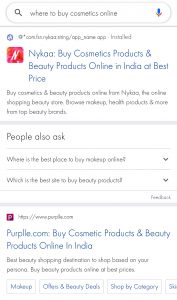30% of consumers won’t even consider a business without a website. What could be the reason? If you’re curious to know, let’s dig deeper!
Nowadays, people spend a hefty time on the Internet, it could be for anything like buying a product, using a service, reading a blog, or for many different reasons. In this case, having a website is a powerful asset for your business as it provides information that can be useful to the particular user who might be searching for it. This encourages businesses to move online.
Having an online presence and a website has become a crucial part of business growth these days.
Here are ten important reasons to prove why your business should have a website.
1. Builds Trust In Your Business
Having a well-designed website is an opportunity to impress and build trust among the people that you are a real business. It also enables potential customers to visit your website and get more information about your business. Without a website, the credibility of your business gets affected. People might doubt your business’s legitimacy.
A customer’s behaviour is highly influenced by what others are saying about your business. Ensure to display the best reviews and testimonials prominently on your website to build trust among the potential buyers and establish social proof.
- It might come in the form of personal customer testimonials, like this review on the website of andMe, an women’s health-oriented company:

- If your business has appeared in articles from newspapers or achieved a milestone, you can also feature those, as Hootsuite has done below:

2. Helps You Reach More Customers and Generate Leads
One of the biggest advantages of having a website for your business is generating leads.
As more and more people are turning to the internet to find what they’re looking for, having a website fed with the right information about your business can help you easily be found online by your potential audience.
This not only helps you grow brand awareness online but also expand the geographical reach that provides you access to potential audiences across the globe (if you’re planning to widen the scope of your business).
It also gives you online visibility 24/7. Remember, the more your business is present online, the more it engages with the audience, the more people know about it, accordingly, increasing the chances of generating more customers.
3. Helps People Discover You Online
Your website is like an address in the virtual world. If you want people to find you online, you need a website.
In simple words, if the visitors are searching for any products, services, or solutions to their problems or needs on the internet; having a website allows them to discover your business (if you’re finding a solution to their problem) within close proximity and get in contact with you.
That is why it’s advisable to leverage Search Engine Optimisation (SEO). Optimising your website based on specific keywords related to your business and what people are searching online will help your website appear on their search results and make it more discoverable. Followed by defining your web pages with accurate title tags and meta descriptions to help identify what the purpose of each web page is.
Another important element to focus on is adding geolocation. Meaning, if you have a physical spot for your business or want people in your area to find you, use local search engine optimization. Making it easier for the local people to find your business when they are looking for something you offer.
For example, when you search the long-tail keywords ‘where to buy cosmetics online’: Search Engine Google ranks Nykaa on the top of your search results followed by Purplle as it mainly depends on the consumers’ preferences and the keywords listed.

4. Leverage Digital Marketing To Direct All Customers To Your Website
Are you still in a dilemma that having a social media page is enough to attract new customers? Then, it’s time to rethink.
Let’s say, you only have a Facebook page for your business considering every other business has it. But, it’s not enough. Why? Facebook has seen a drop in its organic reach from 7.7% (in 2018) to 5.5% (in 2019) to 5.2% (in 2020). Also, the engagement rate has decreased by 0.08% which was 0.25% in 2020. Thus, switching businesses to building websites, too, instead of only relying on social media.
While social media platforms can help grow your business, don’t count on it solely as your marketing channel, especially in this ever-changing world. Preferably make your website the centre of all your marketing efforts. And how can you do it?
If you’re running an advertising campaign, make sure to include your web address in it. This will drive the prospects to your website to learn and explore more about your brand. Or, you can also link the website to your social media profiles from which people can visit your website.
5. Showcase Your Work – Spotlighting Successful Case Studies
Want to create an exceptional impression on your website visitors and potential clients then don’t be shy to showcase your work. Let others know about yourself. A website acts as a unique platform on which you can display a portfolio, images or videos, as well as testimonials about your successful projects and case studies to express your brand personality, experience, and capabilities to the prospects.
For better understanding, here’s an example of Thrive, a digital marketing agency that prominently showcases their clients’ video testimonials and reviews along with the result percentage to build the credibility of their business.

6. Showcase Your Services
For every business, every customer matters. That is why it’s important to showcase your expertise in the best way possible, and having a website with a ‘Services Page’ can help you do that.
To help your prospects find the “FEATURES” of what you’re offering and get more traffic on your website, we suggest you should have a ‘Services Page’. Here you can list down the type of work you do. Plus, describe in which areas you specialise in and show figures of past success to your prospects using:
- Bullet points and graphics to keep the prospect’s attention.
- Photos related to your target audience that connects with your brand.
Eventually, helping you establish a loyal customer base.
For example, Matrix Bricks, a digital marketing agency used infographics to pinpoint the list of services they specialise in and offer it to their prospective clients. As well as disclosing the success rate and the number of experience they have in this area.

7. Around-The-Clock Access
Owing to the internet, people can shop online from anywhere around the world at any time!
Businesses can reach out to all their potential customers by creating a well-defined website that allows them to shop or research the company at any hour of the day.
Generally, great first impressions are 94% design-related. A website with good design portraying relevant information including a contact us section to provide your customers instant access to ask a question, or inform you about a problem with your goods or services. This also gives you the ability to contact your customer instantly and improve your customer service satisfaction rate.
You can adopt the following creative ways to save your time as well as improve customers experience:
- Add ‘Frequently Asked Questions’ Section To Your Website.
If you spend the majority of time answering the same kind of questions for each of your customers then on a website, you can post the answers to these frequently asked questions and guide your customers to visit these pages. As a result, your customers will appreciate the knowledge you provide them and it’ll save your time.
- Introducing Chatbots.
Chatbots address the most common customer queries through template answers. They also notify the visitors on signing-up procedures, any updates about products or services, and so on.
Having a website works like an online brochure or catalogue for your products and/or services. You can update it quickly and easily at any time. It’s also an effective way of keeping your customers up-to-date on new products and/or services. You can inform them of any upcoming events and special promotions.
8. Inform Customers About: Who You Are, What You Do And How To Connect With You

It has been found that on average, a person spends around 6 hours and 42 minutes each day online. And if you want to get discovered, you need to move your business online where people are spending their time. But, it’s crucial to have valid information on the website about your business that can be easily accessed by potential customers whenever they wish to know something about your business.
In this case, a website acts as your digital business card that can be referred by the prospects to learn about:
- Who are you? (which industry are you working in)
- What do you offer? (the products and/or services offered)
- How to contact and locate you? (your contact information, and the location from where you are running your website)
Answering these questions encourages the prospects to build faith and trust in your business.
9. Helps You Understand Your Customers Deeply

Once the visitors start visiting your website, the next crucial step that you should take is to research and analyse your customers. These two popular free website tracking tools – Hotjar and Google Analytics will help you track down the following key performance metrics:
- Regular visitors
- Unique visitors
- Impressions or page views
- Bounce rate
- The average amount of time spent by a visitor on the website
- Users’ search queries
- Top-performing landing pages
- Goal conversion rate
All these statistics can help you learn how you should strategically target your customers with what kind of content as per the visitors’ preferences as well as how you can improve the user experience so that they stay on your website for a longer period.
10. Helps You Stand Out Amongst Competitors Online

While 36% of small businesses don’t have their own website, 64% of them do. Meaning, you are not alone in the market. There are thousands of existing websites having an online presence and working in the same area as you are.
If you want to stand out among your competitors, then your business should have a unique footprint online by:
- Providing effective customer service
- Working on customers feedback, fixing the problem and building strong relationships with their customers
- Being true to the audience about your products and/or services
- Introducing innovative products and/or services to your audience
Focusing your attention on these elements, not only helps you stay competitive but also make your business appear more progressive, and up-to-date.
Concluding that a well-designed website can make your business appear credible. By helping to attract clients and encouraging them to do business with you. As well as, initiating trust levels among your customers and helping you to grow your online presence, proving why you should consider having a website for business.

